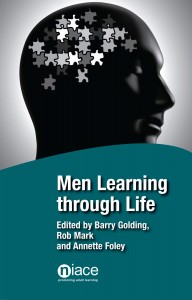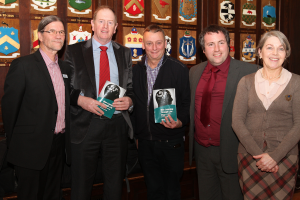 Professor Barry Golding, President of Adult Learning Australia, well known for his work in the Men’s Shed movement has had a long interest in men and lifelong learning. It’s an interest sparked in part by UK researcher Veronica McGivney’s landmark studies over a decade ago which identified that some groups of men are particularly disadvantaged when it comes to adult learning.
Professor Barry Golding, President of Adult Learning Australia, well known for his work in the Men’s Shed movement has had a long interest in men and lifelong learning. It’s an interest sparked in part by UK researcher Veronica McGivney’s landmark studies over a decade ago which identified that some groups of men are particularly disadvantaged when it comes to adult learning.
But Barry says men’s learning has received less attention from scholars than has women’s learning and that the topic often generates outright hostility.
‘The research field of men and lifelong learning is, as Veronica McGivney says in her Foreword, a minefield. Many academics aren’t happy to talk about some men’s disadvantage. Men tend to get left behind in thinking about gender. And yet some men can be as trapped in stereotypes and expectations as some women. Why is it that neighbourhood centres are often filled with women and not with men? When I started writing about the men’s learning in Australia I thought “Why is it just me writing about this?’’

Over the course of the last nine years Barry has sought out researchers and academics across the globe with an interest in men’s participation in lifelong learning. Together with co-editors Dr Annette Foley, Deputy Dean, School of Education & Arts, Federation University (formerly known as the University of Ballarat) and Dr Rob Mark, Head of the Centre for Lifelong Learning, University of Strathclyde, UK, they have put together a book that presents a snapshot from round the world.
In most countries around the world rising unemployment, the impact of the Global Financial Crisis, ageing populations and men retiring at younger ages is increasing the pressure to find ways of increasing men’s participation in learning, particularly beyond the workplace.
The book brings together international researchers from Ireland, Greece, Portugal, China, Australia, New Zealand and the UK who reflect on men’s participation and attitudes to lifelong education and describe the policy and practices that promote or discourage some men’s aversion to learning in each country.
‘Our book argues the case for more learning for men beyond paid work. Learning is one of the few things that can set you up for life, and also buffers you for change beyond work at any age. We have an education system that is reasonably good at getting people into work but not one that helps us handle changes in our lives, particularly post work. So learning opportunities in our adult lives are even more important.’
And there are clear gender differences when it comes to formal and accredited learning that need examining too, Barry says. ‘Take the case of country boys in Victoria. City girls go on to post year 12 education at around four times the rate that country boys do. You can argue that’s because more boys go straight into work and more girls go on to post-secondary education. But why is that? The fact that many younger men are steering clear of adult learning is a worrying trend. It’s a trend that needs reversing if we want to break the cycle of intergenerational aversion to learning.’
‘We know the many benefits that accrue from adult learning – improvements in confidence, health and wellbeing, the social benefits of interacting with others and feeling part of a community. And the costs of not participating are paid for by the entire community.’
‘Our book is a way of saying ‘There’s something going on for some men – here’s the evidence outlining the size and the scope of the problem and its implications – now let’s talk about what we’re going to do about it.’
Men Learning through Life Edited by by Barry Golding, Rob Mark and Annette Foley, NIACE Publications, UK (2014) is available from Footprint Books.
ALA members receive a 20% discount and free freight on all books on the Footprint website. Contact Jacqui at ALA for the discount code.
